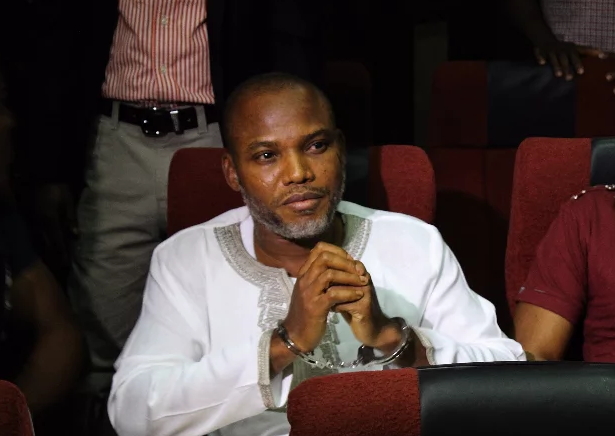The leader of the Indigenous People of Biafra (IPOB), Nnamdi Kanu has dragged both Nigerian and Kenyan governments before the African Commission on Human and Peoples Rights over his arrest and extradition.
KanyiDaily had reported how Nnamdi Kanu was arrested in Kenya and repatriated to Nigeria on July 27, in an operation conducted by Nigerian security operatives in collaboration with international partners.
Although the federal government did not state where Kanu was arrested, his brother, Kingsley Kanu, alleged that the IPOB leader was arrested in Kenya and “handed over to Nigerian authorities who then flew him to Nigeria”.
The United Kingdom had asked Nigeria to clarify the circumstances surrounding Kanu’s arrest after the Kenyan government denied involvement in the arrest and extradition of the IPOB leader.
A statement issued on Tuesday by Kanu’s special counsel, Aloy Ejimakor said that his client’s arrest and eventual deportation to Nigeria were a violation of the African Charter, which Nigeria and Kenya were signatories to.
Ejimakor noted that one of the reliefs being sought is that Nnamdi Kanu must be restored to his state of being before the rendition, which in this case is the United Kingdom.
“A few days ago, I commenced a continental legal action against Nigeria and Kenya before the African Commission on Human and Peoples Rights, demanding accountability for the extraordinary rendition of Mazi Nnamdi Kanu.
“Both countries also have extradition laws that prohibit this sort of reprehensible conduct that saw Kanu to Nigeria.
“Particularly, extraordinary rendition is expressly prohibited under the African Charter, where It provides in pertinent part that “A State may not transfer (e.g. deport, expel, remove, extradite) an individual to the custody of another State unless it is prescribed by law and in accordance with due process and other international human rights obligations. Extraordinary rendition, or any other transfer, without due process, is prohibited”.
“A victim of extraordinary rendition is entitled to remedies mandated by the Charter. Therefore, among many other reliefs, I requested that Kanu be restored to his state of being before the rendition, which state of being was that he travelled to Kenya on his British passport and was duly admitted as such and as a free man.
“Further, that no valid territorial jurisdiction can issue from an act of extraordinary rendition because Kanu is, technically speaking, still in Kenya.
“I also requested the Commission to adopt other urgent measures as the Commission sees fit in the circumstances to protect Nnamdi Kanu in the interim.
“Any nation that dabbles in extraordinary rendition has unwittingly brought impediments to her territorial jurisdiction. So, Nigeria, whether it admits it or not, has triggered a hornets’ nest that has, for the first time, brought the international legal order to bear on the matter of Mazi Nnamdi Kanu.”
This comes after the Federal High Court in Abuja adjourned the trial of Nnamdi Kanu to October 21, due to failure of Nigerian Government to produce him in court on Monday.



!["I Need Your Money To Bribe My Angels” – Pastor Tells Church Members [Video] 2 "I Need Your Money To Bribe My Angels” – Pastor Tells Church Members [Video]](https://media.kanyidaily.com/2021/07/27175143/Pastor-150x150.webp)

![American Rapper, Gunna Arrives In Nigeria For Lagos Concert [Video] 5 American Rapper, Gunna Arrives In Nigeria For Lagos Concert [Video]](https://media.kanyidaily.com/2024/12/21164103/Gunna-150x150.jpg)
![Williams Uchemba Gifts Wife A Rolex Watch After Welcoming Their Second Child [Video] 7 Williams Uchemba Gifts Wife A Rolex Watch After Welcoming Their Second Child [Video]](https://media.kanyidaily.com/2024/12/21160810/Williams-Uchemba-wife-150x150.webp)


![Over 20 People Killed In Stampede At Rice Distribution Event In Okija, Anambra [Video] 13 Over 20 People Killed In Stampede At Rice Distribution Event In Okija, Anambra [Video]](https://media.kanyidaily.com/2024/12/21131654/Anambra-stampede-150x150.jpg)




![Jarvis Vows To Return Peller's Engagement Ring Over His Relationship With UK Lady [Video] 23 Jarvis Vows To Return Peller's Engagement Ring Over His Relationship With UK Lady [Video]](https://media.kanyidaily.com/2024/12/21094158/Peller-Jarvis-150x150.jpg)

